

Digital Citizenship.
Framework for Information Literacy for Higher Education. Filed by the ACRL Board on February 2, 2015.
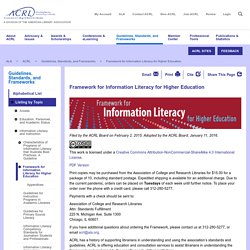
Adopted by the ACRL Board, January 11, 2016. This work is licensed under a Creative Commons Attribution-NonCommercial-ShareAlike 4.0 International License. PDF Version Print copies may be purchased from the Association of College and Research Libraries for $15.00 for a package of 10, including standard postage. Expedited shipping is available for an additional charge. Payments with a check should be sent to: Association of College and Research Libraries Attn: Standards Fulfillment 225 N.
If you have additional questions about ordering the Framework, please contact us at 312-280-5277, or email acrl@ala.org. ACRL has a history of supporting librarians in understanding and using the association’s standards and guidelines. Check for upcoming ACRL eLearning webcasts and online courses. ACRL’s Standards, Guidelines, and Frameworks are provided as a free resource to the academic library community. Contents IntroductionFrames Introduction Notes 1. 2. 3.
A Few Responses to Criticism of My SXSW-Edu Keynote on Media Literacy. Last week, I had the honor of keynoting SXSW-Edu.
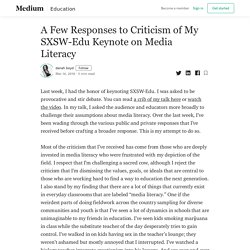
I was asked to be provocative and stir debate. You can read a crib of my talk here or watch the video. In my talk, I asked the audience and educators more broadly to challenge their assumptions about media literacy. Over the last week, I’ve been wading through the various public and private responses that I’ve received before crafting a broader response. Overview of information literacy resources worldwide. This collection of Information Literacy (IL) Resources from around the world is divided into 42 language lists and includes selected resources – from websites, books, journals and other kinds of publications – that were provided by contributors from different countries and institutions and compiled by Dr Forest Woody Horton Jr.
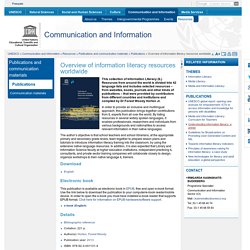
In order to provide an inclusive and multilingual approach, this publication brings together contributions from IL experts from all over the world. By listing resources in several widely spoken languages, it enables professionals, researchers and individuals from various backgrounds and nationalities to access relevant information in their native languages. The author’s objective is that school teachers and school librarians, at the appropriate primary and secondary grade levels, team together to prepare lesson plans and tutorials to introduce information literacy training into the classroom, by using the extensive native language resources. Verification Handbook: homepage. Verifying Identity: Use these online verification tools to find contact details and profiles of users who are active on social media AnyWho: a free white pages directory with a reverse look-up function.AllAreaCodes: a tool that allows users to look up any name and address listed against a phone number.
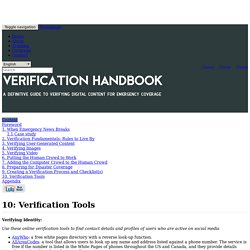
The service is free if the number is listed in the White Pages of phones throughout the US and Canada, and they provide details about unlisted numbers for a small price.BotOrNot: it checks the activity of a Twitter account and gives it a score based on how likely the account is a bot.Email Checker: a tool to check whether an email address exists.Facebook Graph Search: a social search engine that is integrated into Facebook.
It provides a streamlined method to locate individuals. Evaluate: Assessing Your Research Process and Findings – The Information Literacy User’s Guide: An Open, Online Textbook. Introduction In 2010, a textbook being used in fourth grade classrooms in Virginia became big news for all the wrong reasons.
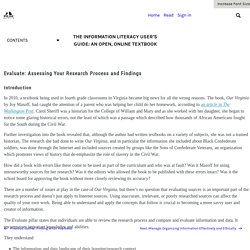
The book, Our Virginia by Joy Masoff, had caught the attention of a parent who was helping her child do her homework, according to an article in The Washington Post. Carol Sheriff was a historian for the College of William and Mary and as she worked with her daughter, she began to notice some glaring historical errors, not the least of which was a passage which described how thousands of African Americans fought for the South during the Civil War. Further investigation into the book revealed that, although the author had written textbooks on a variety of subjects, she was not a trained historian. Real Solutions to Fake News: How Libraries Help. Skip to main content You are here: Home » Activities and Groups » Information Society » News » Real Solutions to Fake News: How Libraries Help Search form 20 August 2017.
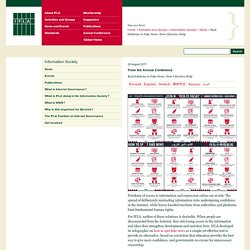
Danah boyd SXSW EDU Keynote. The Facts about Fact Checking: Crash Course Navigating Digital Information #2. Introduction to Crash Course Navigating Digital Information #1. How to choose your news - Damon Brown. How the media landscape has changed Media visionary Clay Shirky gave a TED Talk on how the media landscape has changed.
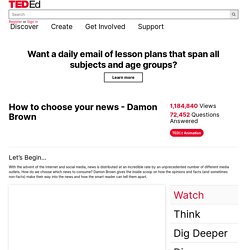
“The moment we’re living through, the moment our historical generation is living through, is the largest increase in expressive capability in human history.” In other words, the amount of information we are capable of capturing is unprecedented. As a result, we need new techniques to filter through the information and need to work much harder than previous generation to better understand our world. Watch Clay Shirky’s fascinating media discussion on TED-Ed. Understanding social media The TED Book “Our Virtual Shadow: Why We Are Obsessed with Documenting Our Lives Online” discusses the challenges of social media turning every day folks into journalists. Evaluating Information: The Cornerstone of Civic Online Reasoning.
The Definitive Source.